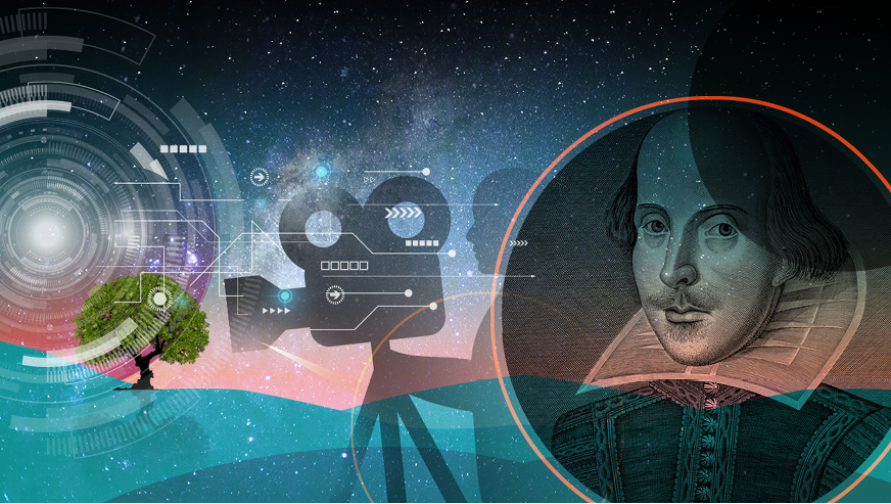
By Tyrus Miller
The humanities are where many future leaders, communicators, scholars, CEOs, storytellers, creatives, directors, writers, and entrepreneurs come to get their start. While the disciplines of the humanities themselves are distinct, together they provide students with a common set of skills that employers of today, and especially those of the future, will rely on.
This is, then, without question, the most exciting time ever to study the humanities and put them to work in the world!
Here are four reasons I believe the future will rely on humanities majors.
1. The credibility of information will only become harder to decipher. As of 2018, social media sites have surpassed print newspapers as a news source for Americans. As such, the continued expansion of social networks will make the ability to determine fact from falsehood a fundamental skill. By engaging with texts, documents and images from different timeframes, geographic regions and points of view, humanists are trained not only to interpret information, but also to assess its reliability and authenticity. Such skills are not just “nice to have”—they are imperative to our democracy that we as citizens can distinguish fact from falsity.
Consider: One of the values of engaging in philosophical and critical thought is thinking deeply through the frameworks that confine our decisions and knowledge itself. UCI is ranked #9 in the nation for epistemology, which is the study of how we know what we know.
2. The humanities are a necessary partner to STEM. Scientific facts require interpretation and dissemination to reach the public and to spark action. Because humanists study culture and values, they are equipped to uncover and analyze the underlying beliefs and motives that may prevent even irrefutable scientific evidence, like that pointing to man-made climate change, from sparking widespread action. One of the most valuable strengths humanists bring to the table is narrative—that is, storytelling. Stories are what spark connection and motivate change. Some of the most important shifts in cultural values and beliefs have been motivated by humanistic writing. Rachel Carson’s Silent Spring and Upton Sinclair’s The Jungle motivated people to question widespread agricultural and industrial practices and inspired change at the governmental level. It’s not just books that do this—art and visual mediums like film and documentary are key parts of the humanist’s toolbox.
Consider: UCI's environmental humanities scholars bridge the traditional divide between the sciences and humanities to look holistically at the past and present’s environmental problems.
3. Technological and medical advancements will need humanists to ensure progress and ethical futures. The humanities are not limited to just the disciplines that fall under their umbrella in university settings. Humanistic perspectives can illuminate any discipline, including technology and medicine, to ensure that human progress and the human experience are accounted for in decisions to advance technology and medicine. One of the fundamental juxtapositions between technological advancement and humanity is played out in Mary Shelley’s novel Frankenstein. Providing a framework from which to compare the scientific method against questions of humanity, the novel uses narrative to walk readers through the question: just because we can do something, should we? This is the power of the humanities—not to halt progress, but to inform the genuine progress that comes only from thoughtful reflection on human values and meaning.
Consider: Some of the topics humanists at UCI have written about include: Asian Americans and mental illness; modern China and mental health; Japanese fiction about radiation; and Flint, Michigan’s lead-in-water crisis.
4. The humanities help catalyze valuable innovations in society, government, business, culture and entertainment, and even science and technology. Innovation arises from the discovery of new facets and hidden aspects of our world, as we confront challenging issues, solve problems, and imagine new designs. The disciplines and expertise of the humanities can train you to frame new questions, interpret texts and images more subtly and more deeply, understand nuances of human motivation and communication, bring together different cultural perspectives productively, and make ethical choices about the values that motivate publics and clients.
Consider: UCI is a world leader in critical theory, interdisciplinary learning, and innovative thought in the humanities.
For students considering the humanities, know that the humanities teach you how to examine your beliefs and those of others, how to write persuasively across mediums (even in social media posts!), how to leverage historical context to inform today’s decisions and mitigate conflict, and how to use your imagination to create something new and to appreciate something that others have created. These are just a few of the reasons I love the humanities—while, as a freshman undergraduate many years ago, I intended to become a biophysicist! My heart and mind were changed, though, when I saw what I could achieve through humanistic study. At the UCI School of Humanities, I now have the joy of seeing our students working across the disciplines in exciting ways, to study the medical humanities, the environmental humanities, the digital humanities, humanities and law, and other innovative paths of new, future-making knowledge.
Tyrus Miller is dean of the School of Humanities at the University of California, Irvine. Prior to UCI, he served as vice provost and dean of graduate studies and as co-provost of Cowell College at UC Santa Cruz, and as the director of the UC Education Abroad Program’s Study Center in Budapest, Hungary. He earned his Ph.D. in English from Stanford University, an M.A. in creative writing from Johns Hopkins University, and a concurrent B.A./M.A. in humanities from Johns Hopkins. He is an internationally recognized scholar of 20th-century art, literature, and culture, with a specialization in the innovative modernist and avant-garde literary and artistic movements of Europe and the United States. He is author of Late Modernism: Politics, Fiction, and the Arts Between the World Wars; Singular Examples: Artistic Politics and the Neo-Avant-Garde; Time Images: Alternative Temporalities in 20th-Century Theory, History, and Art; and Modernism and the Frankfurt School.
